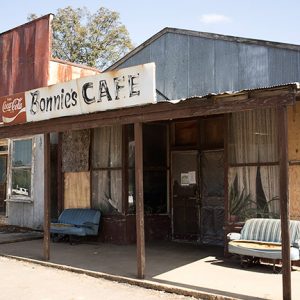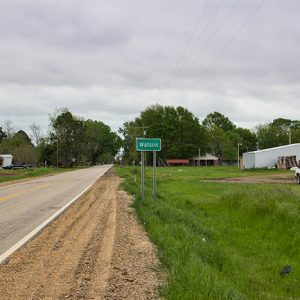calsfoundation@cals.org
Watson (Desha County)
| Latitude and Longitude: | 33º53’42″N 091º15 22″W |
| Elevation: | 148 feet |
| Area: | 0.20 square miles (2020 Census) |
| Population: | 185 (2020 Census) |
| Incorporation Date: | December 2, 1907 |
Historical Population as per the U.S. Census:
|
1810 |
1820 |
1830 |
1840 |
1850 |
1860 |
1870 |
1880 |
1890 |
1900 |
|
– |
– |
– |
– |
– |
– |
– |
– |
– |
– |
|
1910 |
1920 |
1930 |
1940 |
1950 |
1960 |
1970 |
1980 |
1990 |
2000 |
|
139 |
254 |
282 |
236 |
209 |
312 |
371 |
433 |
282 |
288 |
|
2010 |
2020 |
|
|
|
|
|
|
|
|
|
211 |
185 |
|
|
|
|
|
|
|
|
Watson (Desha County) is a second-class city twenty miles north of McGehee (Desha County) and fourteen miles east of Dumas (Desha County). Its location has always been somewhat isolated by the Arkansas River a few miles to the north and the Mississippi River to the east. The nearest bridge over the Arkansas River is at Pendleton (Desha County) ten miles northwest. The nearest bridge over the Mississippi River is forty miles south at Lake Village (Chicot County). The White River is also nearby.
When Watson was first settled, the proximity to the rivers was an advantage. Since Henri de Tonti established what would become Arkansas Post in 1686 across the Arkansas River from present-day Watson, early French trappers plied the Red Fork Bayou, camping at the site that would become Watson, as had the Quapaw. The Red Fork Bayou was a shortcut from the Arkansas River to the Mississippi River during high water. An Indian “trace” or trail on the east side of the bayou is historically noted.
Watson is in Red Fork Township, one of the county’s original townships carved from Arkansas County in 1838. The Watson area is situated in the lower Mississippi Alluvial Plain and known as the Westside Delta Lands. The lands are protected from overflows by the Arkansas and Mississippi rivers by a system of levees and drained by the Cypress Creek Drainage District canals and auxiliary ditches.
Watson was first called Watson Station when the Little Rock, Pine Bluff and New Orleans Railroad was established in 1868 to cross diagonally through the county on the surveyed and abandoned roadbed of the Little Rock, Pine Bluff and Napoleon Railroad. The Texas, Mississippi River and Northwestern Railroad purchased the bankrupt Little Rock, Pine Bluff and New Orleans Railroad and operated through Watson Station until about 1878. In 1877, an African American man named Henry Jackson was lynched near Watson.
The opening of the railroad began a building boom at Watson. Another boom was the relocation of the county seat to Watson in 1874 from Napoleon (Desha County). Napoleon was situated at the confluence of the Arkansas River and Mississippi River, into which it eventually disappeared. The county seat remained at Watson until December 1880, when it was moved to Arkansas City (Desha County), which had grown into a major port on the Mississippi River. Development ceased with the loss of the county seat and the relocation of the railroad through Dumas twenty miles to the west.
In September 1904, the St. Louis, Iron Mountain and Southern Railroad completed a rail line over the Arkansas River to Watson from Helena (Phillips County). This tapped the prosperous timber industry. Numerous sawmills operated, and business thrived in Watson until the Flood of 1927. When the railroad ceased operation in 1969, Watson still had the look of a frontier town, as it was often called. The Arkansas Department of Parks and Tourism is continuing the rails-to-trails Delta Heritage Trail from Helena, through the rustic White River National Wildlife Refuge, over the Arkansas River, and through Watson. It is hoped that bike riders will take advantage of this venture and a tourist trade can develop.
It took many years for Watson and Desha County to recover from the Flood of 1927, but in the 1930s and 1940s, many families moved to the area to become day laborers on farms that managed to survive. Numerous new residents later bought land, which their descendants still farm. Watson thrived until mechanization and the development of herbicides in the late 1950s lessened the need for abundant day labors.
Watson schools merged with the Desha Central School District at Rohwer (Desha County) on July 1, 1972. Following the merger, the two districts became the Delta Special School District 5. The enrollment of the Watson schools at the time of the merger was 384. In 2004, Delta Special School merged with McGehee, where children from Watson are now bussed.
Watson has a mayor/council form of government. Farming-related occupations are Watson’s main source of income, but it also offers excellent fishing and hunting opportunities.
The Watson Chamber of Commerce sponsors the Watson Fish Fry the third Saturday in March. This event began in 1960. Often, more than 1,000 people flock to the old school gymnasium for the food and festivities. Most attending are former residents returning annually from across the United States to reunite with old classmates. Items are donated to be auctioned off at the event, and funds are used for community projects and to help families in need.
For additional information:
Merritt, Jim. “The Desha County Town of Watson.” 1981 Programs of the Desha County Historical Society (Spring 1982): 53–67.
Helen Pennington
Pine Bluff, Arkansas









Comments
No comments on this entry yet.